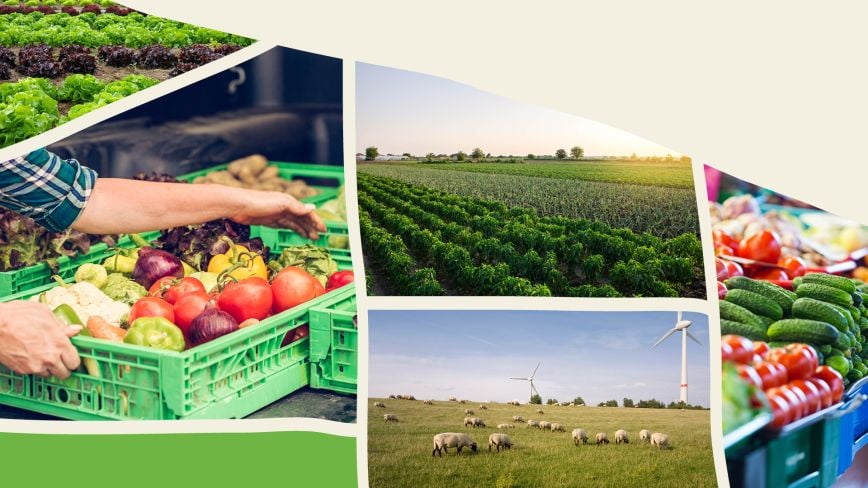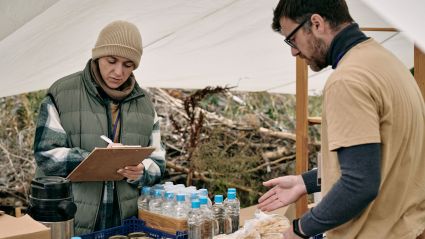SVG

Building a Sustainable and Resilient Food System
Overview
Feeding Change mobilizes global partnerships to address food systems as a climate issue through sustainable agriculture, food resiliency, and climate financing.
Perspectives on a Natural Capital Approach to Financing Food Systems Transformation
This brief seeks to investigate and illuminate the approach of investing in natural capital through a food systems lens.

Building a Sustainable and Resilient Food System
Related Content

A Blueprint for Employer-Led Food as Health Strategies
Employers are increasingly recognizing how food can promote whole-person health by addressing physical well-being, resilience, disease prevention, and mental health.Read Report
Perspectives on a Natural Capital Approach to Financing Food Systems Transformation
In September 2024, the Milken Institute released Insights on Investments in Food Systems Transformation: Pathways to COP30, which explored the state of food systems investing, the risks and benefits, and the challenges and opportunities.Read Report
Embrace Complexity
Disasters are complicated. The facts on the ground change quickly. Those changes can seem overwhelming, unless you’re ready for them. I talk all the time about embracing complexity, not running away from it. Our job is to transform...Read Essay
Rooted in Health: How Agriculture and Health Care Can Grow Together
With chronic diseases on the rise and millions struggling with food insecurity, access to fresh, nutrient-rich fruits and vegetables has become more critical than ever. The "Food is Health" movement is reshaping how we think about health...Read Essay
How Philanthropy Can Build Resilient Food Supply Chains
From the COVID-19 pandemic to geopolitical conflicts, and catastrophic steering failures on cargo ships, as reported by NPR and The New York Times, the world has seen how a weak link in a supply chain can have far-reaching consequences for...Read Article
Insights on Investments in Food Systems Transformation: Pathways to COP30
This brief synthesizes those conversations into four key themes related to the trends, challenges, and opportunities for public, private, and nonprofit capital to drive food systems transformation.Read Report
Valuing Nature Is an Economic Imperative
Nature has long been undervalued and misunderstood. The belief that nature exists to serve humankind is dangerous for the planet and people. A modern worldview of the importance of nature should take its cue from the findings of The...Read Essay
How Checking Out at the Register Could Help Solve Climate Change
Humanity has made significant progress in overcoming some of its greatest challenges, including disease, hunger, and poverty. However, climate change now threatens to reverse this hard-earned progress. Since the Paris Agreement in 2016, the...Read Essay
Key Trends in Health at Milken Institute Global Conference 2024
This brief summarizes the key trends, ideas, and solutions discussed at the Milken Institute Global Conference 2024 to increase access to innovation and improve health outcomes.Read Report
Related Event Sessions
 Decarbonization and the Path Towards Sustainable Food Systems2024 Asia Summit
Decarbonization and the Path Towards Sustainable Food Systems2024 Asia Summit Food Systems as an Asset Class2024 Global Conference Session
Food Systems as an Asset Class2024 Global Conference Session COP28 and Beyond: Food Systems Financing2023 Middle East and Africa Summit Session
COP28 and Beyond: Food Systems Financing2023 Middle East and Africa Summit Session Investing in Food Systems to Address Climate Change2023 Asia Summit Session
Investing in Food Systems to Address Climate Change2023 Asia Summit Session Investing in Food Systems to Address Climate Change2023 Global Conference Session
Investing in Food Systems to Address Climate Change2023 Global Conference Session Closing Plenary: The Future of Food and Health Part 2: A Conversation with Secretary of Agriculture Tom Vilsack2022 Future of Health Summit Session
Closing Plenary: The Future of Food and Health Part 2: A Conversation with Secretary of Agriculture Tom Vilsack2022 Future of Health Summit Session Building Resilient Food Systems: Applying Lessons from Disaster Response2022 Future of Health Summit Session
Building Resilient Food Systems: Applying Lessons from Disaster Response2022 Future of Health Summit Session The Intersection of Agriculture, Food, and Technology2022 Middle East and Africa Summit Session
The Intersection of Agriculture, Food, and Technology2022 Middle East and Africa Summit Session Innovations to Build Food Resiliency Climate Change and the Future of Food | Part 1: Global Food Resiliency2022 Asia Summit Session
Innovations to Build Food Resiliency Climate Change and the Future of Food | Part 1: Global Food Resiliency2022 Asia Summit Session
Business Council
Feeding Change is a team of food system experts within the Milken Institute who activate social and financial capital, engage policymakers and industry leaders, and convene key stakeholders to catalyze a more nutritious, sustainable, resilient, and equitable food system.









